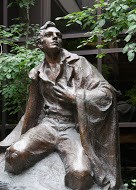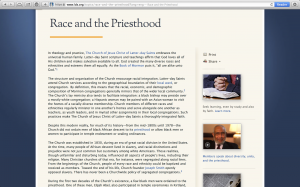Emily Nevers was serving a mission in Ukraine and experiencing widespread atheism for the first time in her life. A native of Salt Lake City, Nevers found herself preaching and serving and unexpectedly, doubting.
While on her mission, Nevers developed what she called a “justice complex.” She didn’t understand why the people were “so good and pure and yet were slaughtered by hardship.” At one time, she even questioned the existence of God.
Within a church that emphasizes knowledge and testimony, doubting members can feel ostracized and judged. Many individuals who experience doubt feel increased discouragement when they don’t know who to talk to, and fear judgement from friends and family.
Nevers returned from her mission in December 2013 and is now a senior double majoring in Russian and communication disorders at BYU. She admits the doubt she felt during her mission was not a singular issue, but she has since learned ways to put doubts “on a shelf” rather than allowing them to consume her.
“Some of the questions don’t have a profound influence on life. Now I’m in a place where I know what to do when the doubts come,” Nevers said.
Nevers is not alone.
A 2011 survey of American Mormons by the Pew Research Center found that 77 percent of people who are current Latter-day Saints say they believe wholeheartedly in all the teachings of Mormonism. But 22 percent say they find some of the church’s teachings hard to believe.

At BYU, faith is encouraged and taught in all classes. However, expressing doubt and feeling comfortable asking questions can be difficult.
Professor of Church History J.B. Haws suggested providing safe places to discuss difficult topics.
“We can create situations in our families and our classrooms at BYU and at church where everyone feels safe to bring up questions. … Parents and teachers and church leaders should be explicit about that and expressly state that all questions are welcome and valued,” Haws said.
Megan Armknecht, a BYU senior from Lindon studying English, initially questioned the place of women in the church and some issues in church history. But it wasn’t until she studied abroad at Cambridge that she began facing even harder questions.
Armknecht realized her beliefs were in stark contrast to the philosophies she was being taught at Cambridge.
Because her parents never discouraged asking questions, Armknecht was not overwhelmed with doubt; she felt free. She learned the place of doubt.
“Everybody comes up against that wall, and there are questions we just don’t have the answers to. Doubt isn’t bad; fear is. Doubt is part of faith and part of growing.”
BYU university chaplain James Slaughter helps non-LDS students wrestling with their own doubts. He is also a counselor in the bishopric of a young single adult ward, where he sees some of the unfortunate effects of doubt.
“For some it causes anger and disillusionment towards the church; for others they struggle as to whether they tell family,” Slaughter said.
Throughout the history of The Church of Jesus Christ of Latter-day Saints, doubt has been a part of the experience for many members.
“Doubt is part of the human experience. We all come to faith from some other place, whether we call it doubt or ignorance or immaturity. Faith emerges out of some version of doubt. I don’t fear doubt, however. I think there are good ways and bad ways of dealing with doubt,” said Spencer Fluhman, a BYU professor of history.
The Internet has increased the dissemination of information and misinformation about the church, spurring both increased faith and doubts.
“The Internet has changed the nature of the game. I think it’s about having faith in an information age, when all of these ideas and interpretations from every conceivable angle are right in your face within seconds of asking a question online,” Fluhman said.

To address common criticisms in church history, the LDS Church has released new essays on lds.org regarding controversial topics such as polygamy and race and the priesthood.
Haws feels these steps “can help promote awareness of the reality that the Church is dealing very candidly and openly with these issues.”
Clinical social worker and BYU graduate Rachel Brown, who experienced her own faith crisis while a student, suggests openness as a healthy way to work through personal doubts that may feel overwhelming.
“Please don’t believe that struggling with doubt makes you in any way unworthy. Give yourself access to support that feels authentic and safe for you. Find a friend, counselor or church leader who can help you process your feelings in a non-judgmental space. Let yourself take the time you need to pray, meditate, journal or talk it out,” Brown said.
Additionally, Fluhman suggested members can successfully deal with doubts by becoming comfortable with ambiguity and with the human side of the church experience.
“All good things about faith don’t have to be chucked because you are working through doubt. Serve through doubt, love through doubt, be generous through doubt,” Fluhman said. “Give faith space to bloom; if you don’t have it right now, that’s fine, but give space for it. Be open to that gift coming in ways and in places that you didn’t expect.”




